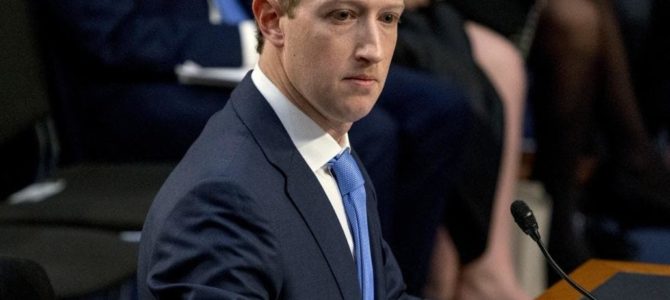
In the year 2018, at the height of The Russia Scare, the Facebook CEO Mark Zuckerberg was hauled in front of a tribunal of tech-illiterate politicians and asked to explain himself. “It was my mistake, and I’m sorry,” Zuckerberg told senators upset about the company’s exploitation (and fumbling) of user data – which, unbeknownst to them, was social media’s entire business model.
A number of panics have brought us to this preposterous place: The notion that Russian trolls on Facebook could swing the 2016 election and undermined our “democracy;” the idea that Facebook’s leftward bias is so corrosive the company should be regulated like a utility; and, finally, the general way in which social media tends to reveal the ugly side of human nature — which is indeed scary, but has little to do with any particular platform.
Granted, one platform that never seems to fail us is the dais at the Senate. If one could brush aside the bipartisan preening and soundbites during the Zuckerberg hearings, he would be still subjected to an infuriating mix of ignorance and arrogance. Across the media, it was accurately noted that the United States is, in large part, run by a bunch of elderly politicians completely unsuited to regulate the tech industry. The obvious lesson, though, was still lost on many. Rather than trying to elect more technocrats, we should come to terms with the fact that, in an increasingly complex world, politicians will always be unsuited to regulate most industries, which is why they should do so only sparingly.
Not that ignorance has ever stopped senators from grandstanding. Republican John Kennedy, for instance, believes Facebook should be disciplined because its users erroneously assumed the service was free. “Your user agreement sucks,” said Kennedy, describing a perfectly legal document that had already been subjected to an array of contractual regulations and was probably read by only a fraction of social media giant’s users. “The purpose of that user agreement is to cover Facebook’s rear end, it’s not to inform users of their rights,” he went on to say, “I don’t want to vote to have to regulate Facebook, but by God I will.”
So if a private entity follows the law, but happens to upset the sensibilities of a power-abusing bully in the United States Senate, they will, by God, be punished by with some nannyistic intrusion or byzantine regulation?
Well, not really punished, right? Because of course the rent-seeking Facebook desires more regulation. For one, it would make the state partially responsible for many of the company’s problems — meting out “fairness,” writing its user agreements, and policing speech – but, more importantly for Zuckerberg, it would add regulatory costs that Facebook could afford but upstart competition almost certainly could not.
It’s a long-standing myth that corporate giants are averse to “regulations” or that those regulations always help consumers. We’ve already seen the hyper-regulation of health-care “markets” create monopolies and undermine choice. We’ve seen the hyper-regulation of the banking industry inhibit competition and innovation. Politicians, often both ignorant of specifics and ideologically pliable, tend to fall sway to the largest companies, which end up dictating their own regulatory schedules. I mean, Lindsey Graham of South Carolina actually asked a compliant Zuckerberg to submit a list of government interferences he might embrace.
The bigger, ideological, problem with the Facebook circus is that our politicians are acting as if being subjected to an opinion — or to an ad — they dislike is some kind of attack on an individual’s rights. Not one senator will ever tell his or her constituents: Hey, if you don’t like the way Facebook conducts itself or you’re unhappy about its political bias or you don’t like that smaller companies also get to target you with content, then leave. No one is forcing you to open or maintain an account with Facebook, much less forcing you to hand over data. And if you’re constantly falling for fake news, well, that’s your problem, because the state can’t fix stupid.
Yet to assure senators that he could, in fact, control billions of interactions, Zuckerberg noted that in five to ten years his company would possess artificial intelligence technology sophisticated enough to eliminate “hate speech” and “fake news” before it was even posted. If Facebook wants to use that technology, it has the right to do so, of course. But many of us who are familiar with the expansive definition of “hate speech” and the people who curate “fake news,” think, well, no thank you. Moreover, the idea that the platform should be responsible for governing the speech of billions of users is not only dangerous, it’s also incredibly expensive.
Sen. Ben Sasse had a good point when he told Zuckerberg that although Facebook may decide it needs to police speech, “I think America may be better off not having been policed by one company that has a really big and powerful platform.” The answer to quelling the outrage mob isn’t for the government to help Facebook entrench its position with some cronyistic regulation, but to let Facebook fix itself or go the way of MySpace.








